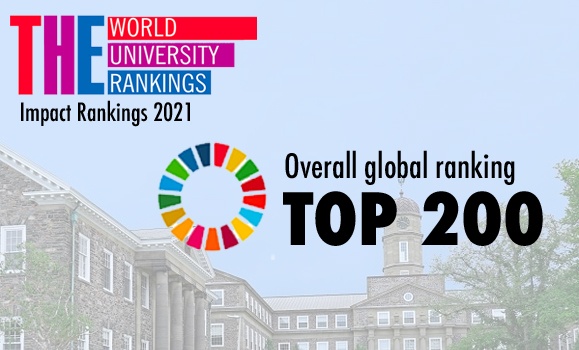Dalhousie continues to rank among the top 200 universities in the world that are making impact in their communities and the world. The latest tally highlights the university’s strengths in supporting good health and well-being, clean water and sanitation and responsible consumption and production.
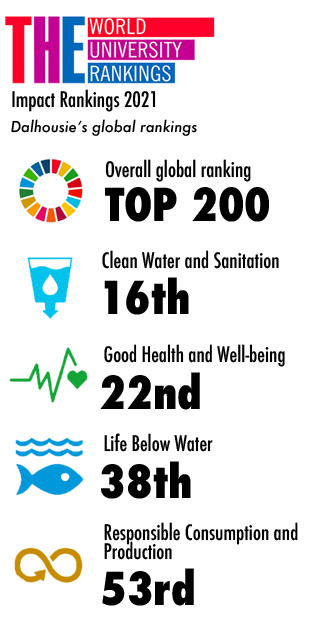 On Wednesday, April 21, , which assess and evaluate university success in delivering the United Nations Sustainable Development Goals (SDGs). Now in their third year, the rankings include metrics from universities across 94 countries.
On Wednesday, April 21, , which assess and evaluate university success in delivering the United Nations Sustainable Development Goals (SDGs). Now in their third year, the rankings include metrics from universities across 94 countries.
This year Dalhousie ranks 101-200 out of 1,115 ranked universities. This is a small a drop in placement from last year’s rank of 85, but the change, for the most part, can be attributed to the addition of 348 universities in this year’s ranking.
Dalhousie maintained a strong overall score of 81.5, which is the result of combining the university's top scoring areas: SDG3: Good Health and Wellbeing (86.6), SDG6: Clean Water and Sanitation (76.8), and SDG12: Responsible Consumption and Production (78.3) and the mandatory SDG17: Partnership for the Goals (65.5).
Top areas of impact
The rankings highlight Dalhousie’s commitment to tackling some of humanity’s most pressing problems in a few key areas.
Dalhousie ranked 16th (of 520) in the world and 3rd in Canada for research, outreach and stewardship in relation to SDG6: Clean Water and Sanitation. The university's success in this area comes from a combination of institutional water usage and care and research strength in this area.
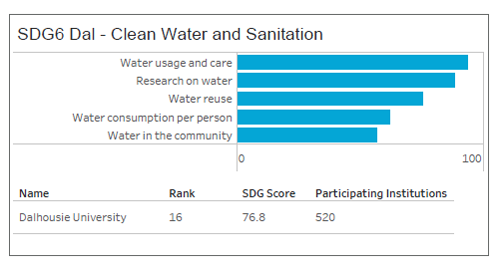
Dalhousie ranked 22nd (of 871) globally and 4th nationally for its contribution to SDG3: Good Health and Wellbeing, a result that’s predominantly due to collaborations with health services and research on health and well-being.
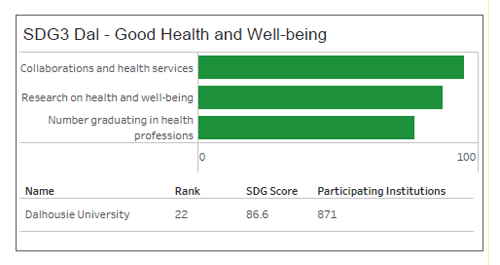
This year, Dalhousie’s rank related to SDG14: Life Below Water is 38th (of 379) in the world and 5th in Canada thanks to education and action in support of aquatic ecosystems and research breadth in this area.
The university also ranked well in a new area this year, SDG12: Responsible Consumption and Production. Dalhousie ranked 53rd (of 503) globally and 10th nationally based on effective waste recycling, research in the area and the publication of Dal's sustainability report.
The more the merrier
This year, Dalhousie submitted evidence for ten of the 17 SDGs, three more than last year.
Dal’s submission included metrics related to: SDG3: Good Health and Well-being; SDG5: Gender Equality (new this year); SDG6: Clean Water and Sanitation; SDG9: Industry, Innovation, and Infrastructure; SDG10: Reduced Inequality; SDG12: Responsible Consumption and Production (new this year); SDG14: Life Below Water; SDG15: Life on Land (new this year); SDG16: Peace and Justice Strong Institutions; and the mandatory SDG17: Partnerships to Achieve the Goals.
Though only Dal’s top three scoring areas (plus SDG17) are included when calculating the institution’s overall score and placement, it’s a notable achievement that all of Dalhousie’s scores in the submitted areas exceeded the worldwide medians.
Research, outreach and stewardship
The indicators for a university’s contribution to each Sustainable Development Goal focus on a combination of research output, community outreach and institutional stewardship. In other words, in addition to the incredible efforts Dalhousie researchers contribute to solving some of the world’s most complex global issues, the scores also consider how the university walks the talk.
For example, for SDG14: Life Below Water, seven of the 26 possible points come from CiteScore metrics, field-weighted citation index and the number of papers published in the subject area. The rest of the points come from evidence that’s submitted by the institution to demonstrate effort in supporting aquatic ecosystems through education and action, practices for water sensitive waste disposal and commitment to maintaining a local ecosystem.
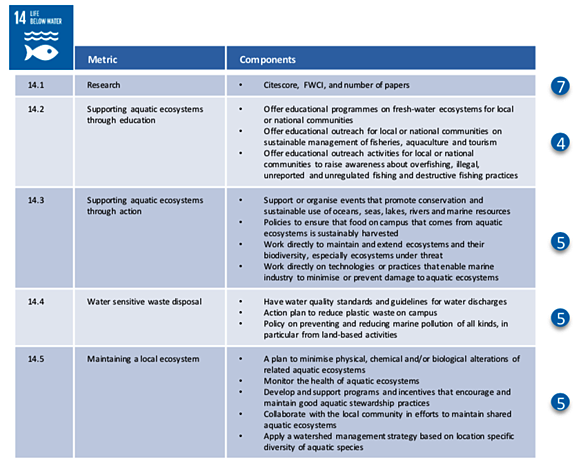 With such in-depth exploration of the university’s efforts in support of the UN SDGs, the data collection for the impact rankings is a very extensive exercise.
With such in-depth exploration of the university’s efforts in support of the UN SDGs, the data collection for the impact rankings is a very extensive exercise.
Led by Dal Analytics with considerable support from Office of VP Research & Innovation and the Office of Sustainability, the high-level process involves identifying the optimum data providers for each individual component and then collaborating with the data providers for evidence that includes quantitative information and qualitative information that must be supported by public (online) documentation. Finally, Dal Analytics collates the information they’ve received, review it and complete the data submission in the portal.
Beyond the rankings
The United Nations’ Sustainable Development Goals have become an important part of Canadian university strategy in part because the call to end poverty, protect the planet and improve the lives and prospects of everyone, everywhere is such a compelling purpose that aligns well with the basic tenets of a university education.
According to , “as of the beginning of 2021, more than a third of member institutions include the SDGs in one of their main strategies. ... It is [also] important to note that most, if not all, institutions have faculty members, researchers and/or students conducting research on the SDGs or using the SDGs in their work and publications.” This report highlighted Dalhousie as an example for having grounded the university’s Strategic Research Direction for 2018-23 in the SDGs.
The 17 SDGs were adopted by all UN Member States in 2015, as part of the 2030 Agenda for Sustainable Development which set out a 15-year plan to achieve the Goals. The UN reports that while “progress is being made in many places, overall, action to meet the Goals is not yet advancing at the speed or scale required. 2020 needs to usher in a decade of ambitious action to deliver the Goals by 2030.”
Participation in the THE Impact Rankings gives Dalhousie an opportunity to both showcase and assess Dal's contribution in relation to the SDGs and provides valuable insight on the university's success in working toward a better future for us all.

